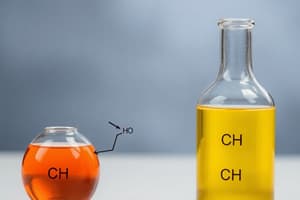Podcast
Questions and Answers
What is the chemical equation for the reaction of benzene with carbon monoxide and hydrogen chloride in the presence of anhydrous AlCl3 / CuCl?
What is the chemical equation for the reaction of benzene with carbon monoxide and hydrogen chloride in the presence of anhydrous AlCl3 / CuCl?
C6H6 + CO + HCl -> C6H5CHO + H2O
What is the chemical equation for the reaction of an alkyl or aryl cyanide with tin(II) chloride and hydrochloric acid followed by hydrolysis?
What is the chemical equation for the reaction of an alkyl or aryl cyanide with tin(II) chloride and hydrochloric acid followed by hydrolysis?
RCN + SnCl2 + HCl -> RCH=NH -> RCHO
What is the chemical equation for the reduction of an acid chloride with diisobutylaluminium hydride (DIBAL-H) followed by hydrolysis?
What is the chemical equation for the reduction of an acid chloride with diisobutylaluminium hydride (DIBAL-H) followed by hydrolysis?
R-COCl + DIBAL-H -> R-CH=O
State the type of reaction used in the Rosenmund reaction, along with the reagent used.
State the type of reaction used in the Rosenmund reaction, along with the reagent used.
Flashcards
Gattermann-Koch Reaction
Gattermann-Koch Reaction
Benzene reacts with carbon monoxide (CO) and hydrogen chloride (HCl) in the presence of a catalyst (like AlCl3 or CuCl) to produce benzaldehyde or substituted benzaldehydes.
Stephen Reaction
Stephen Reaction
Acyl or aryl cyanides are reduced to imines, then hydrolyzed to form aldehydes using stannous chloride (SnCl2) and hydrogen chloride (HCl) in ether solution.
Rosenmund Reaction
Rosenmund Reaction
Acyl chlorides are reduced to aldehydes with hydrogen (H2) in the presence of palladium on barium sulfate (Pd/BaSO4) catalyst in xylene.
Acyl Chloride
Acyl Chloride
Signup and view all the flashcards
Aldehyde
Aldehyde
Signup and view all the flashcards
Benzaldehyde
Benzaldehyde
Signup and view all the flashcards
Catalyst
Catalyst
Signup and view all the flashcards
Study Notes
Gattermann-Koch Reaction
- Benzene reacts with carbon monoxide and hydrogen chloride in the presence of anhydrous aluminum chloride/copper chloride to form benzaldehyde or substituted benzaldehydes.
Stephen Reaction
- Alkyl or aryl cyanides in ethereal solution are reduced with stannous chloride and hydrochloric acid. This forms an intermediate, which is then hydrolyzed with water to produce aldehydes.
Rosenmund Reduction
- Acyl chlorides are reduced to aldehydes using hydrogen gas in the presence of palladium on barium sulfate (Pd/BaSO4) catalyst. This reaction is carried out in xylene.
- Different acyl chlorides (CH₃COCl, C₆H₅COCl) produce the corresponding aldehydes (CH₃CHO, C₆H₅CHO).
Studying That Suits You
Use AI to generate personalized quizzes and flashcards to suit your learning preferences.




